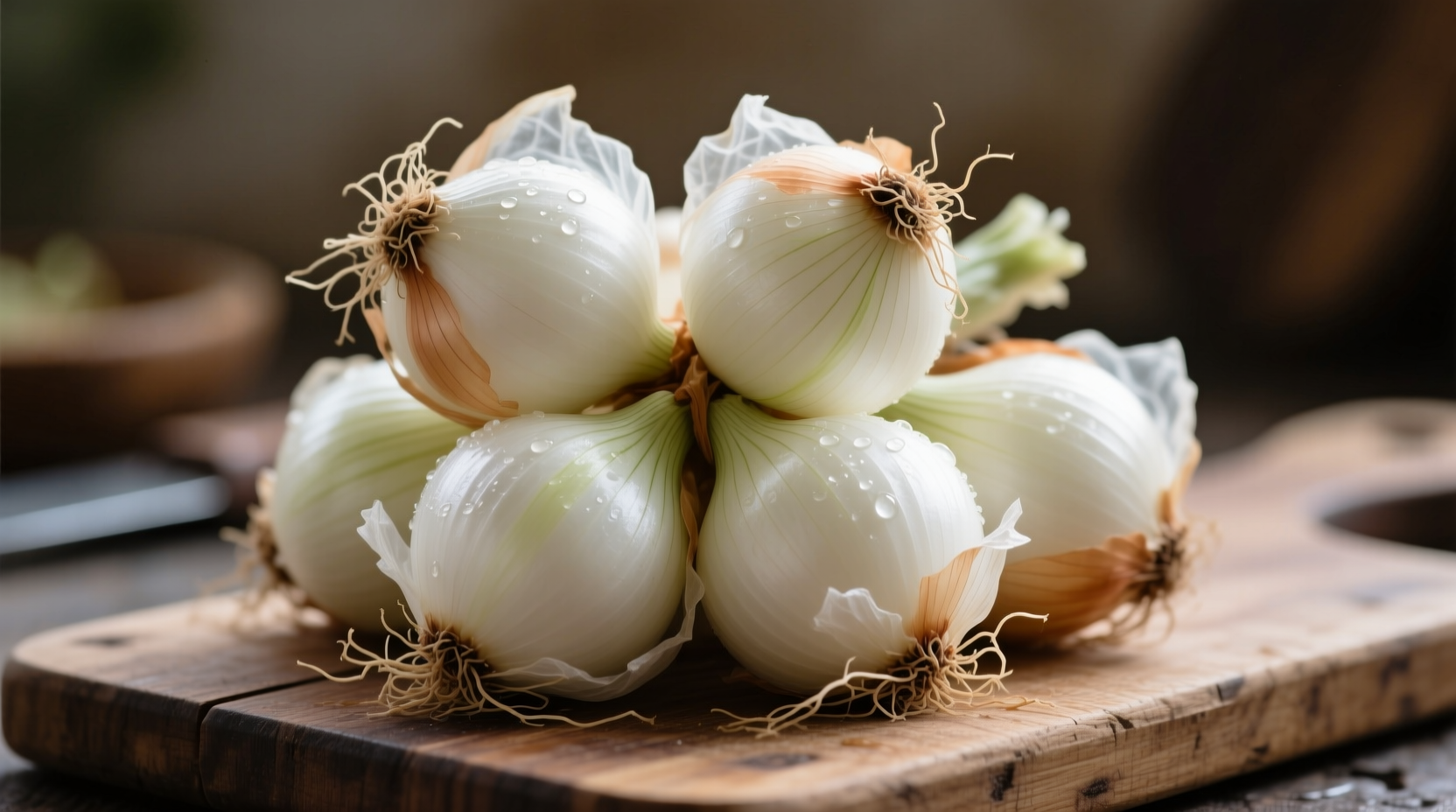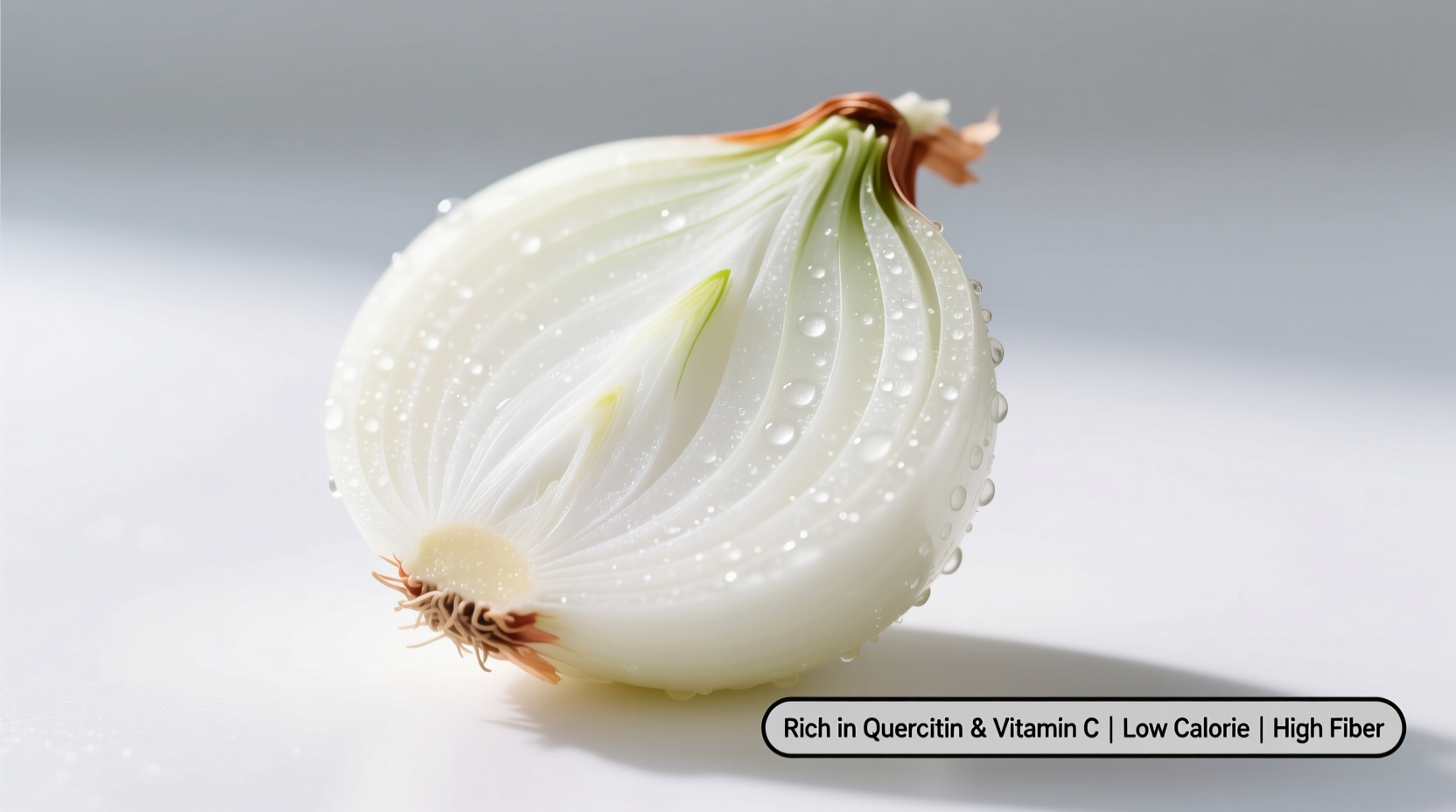Discover why white onions deserve a permanent spot in your kitchen beyond their culinary versatility. These crisp, mildly pungent bulbs pack a powerful nutritional punch that can significantly enhance your daily nutrient intake while delivering unique health-promoting compounds not found in other onion varieties.
White Onion Nutritional Profile Breakdown
According to the USDA FoodData Central database, a standard 100-gram serving of raw white onion provides:
| Nutrient | Amount per 100g | % Daily Value* |
|---|---|---|
| Calories | 42 kcal | 2% |
| Carbohydrates | 9.3 g | 3% |
| Dietary Fiber | 1.7 g | 6% |
| Sugars | 4.2 g | - |
| Protein | 1.1 g | 2% |
| Vitamin C | 7.4 mg | 8% |
| Vitamin B6 | 0.12 mg | 7% |
| Folate | 19 μg | 5% |
| Potassium | 146 mg | 3% |
| Manganese | 0.13 mg | 6% |
*Percent Daily Values based on a 2,000 calorie diet. Source: USDA FoodData Central, ID 11282
White Onion vs. Other Varieties: Nutritional Differences
While all onions share similar nutritional foundations, white onions have distinct advantages in certain areas. The following comparison reveals key differences that might influence your cooking choices:
| Nutrient | White Onion | Yellow Onion | Red Onion |
|---|---|---|---|
| Quercetin Content | Moderate | High | Very High |
| Anthocyanins | None | None | Significant |
| Sulfur Compounds | Higher allicin potential | Moderate | Moderate |
| Water Content | 89% | 87% | 89% |
| Texture When Raw | Crisp, juicy | Firmer | Firm with slight bite |
Research published in the Journal of Agricultural and Food Chemistry confirms that white onions contain higher concentrations of certain organosulfur compounds that convert to allicin when cut or crushed. This compound shows promising effects on cardiovascular health and blood sugar regulation compared to other varieties.
Health Benefits Backed by Science
The unique nutritional composition of white onions translates to several evidence-based health benefits:
Cardiovascular Support
The organosulfur compounds in white onions help reduce blood pressure and improve cholesterol profiles. A 2022 review in Nutrients highlighted that regular onion consumption correlates with a 17% lower risk of cardiovascular disease. The potassium content (146mg per 100g) also contributes to healthy blood pressure regulation.
Blood Sugar Management
White onions contain compounds that enhance insulin sensitivity. A clinical trial published in the International Journal of Food Sciences and Nutrition found that participants who consumed onions daily showed significantly better blood glucose control than the control group. The chromium content in onions plays a key role in carbohydrate metabolism.
Digestive Health Enhancement
With 1.7g of fiber per 100g, white onions contribute to daily fiber needs while providing inulin, a prebiotic fiber that feeds beneficial gut bacteria. Research from the University of California shows that inulin from onions increases Bifidobacteria populations by up to 30% in just four weeks.
Practical Applications in Your Diet
Maximize the nutritional benefits of white onions with these evidence-based strategies:
Optimal Preparation Methods
To preserve maximum nutrients:
- Chop and wait: Cut onions and let them sit for 10 minutes before cooking to maximize allicin formation
- Light cooking: Sauté briefly on medium heat rather than prolonged high-heat cooking
- Raw consumption: Include raw white onions in salads and salsas for maximum enzyme activity
Ideal Pairings for Nutrient Absorption
Combine white onions with:
- Foods high in fat (avocado, olive oil) to enhance absorption of fat-soluble compounds
- Vitamin C-rich foods (bell peppers, citrus) to boost iron absorption from plant foods
- Garlic to create synergistic health effects from combined organosulfur compounds
Storage and Selection Tips
Proper storage maintains nutritional value:
- Store whole bulbs in a cool, dry, dark place with good air circulation
- Refrigerate cut onions in airtight containers for up to 7 days
- Choose firm bulbs with dry, papery skins and no soft spots
- Avoid sprouted onions as nutrient content decreases significantly
Contextual Considerations
While white onions offer numerous benefits, certain situations warrant caution:
- Individuals with irritable bowel syndrome (IBS) may experience discomfort due to FODMAP content
- Those taking blood thinners should maintain consistent consumption rather than dramatic increases
- People with acid reflux may need to limit raw onion consumption
According to the International Foundation for Gastrointestinal Disorders, approximately 15% of the population experiences digestive discomfort from raw onions. Cooking onions reduces this effect while preserving many beneficial compounds.

White Onion Nutrition: Practical Summary
White onions represent an excellent source of essential nutrients with unique health-promoting compounds. Their higher water content makes them particularly refreshing in raw applications, while their distinctive sulfur compounds offer specific cardiovascular benefits. Incorporating just half a cup of white onions daily can significantly contribute to your overall nutrient intake and support multiple aspects of health.











 浙公网安备
33010002000092号
浙公网安备
33010002000092号 浙B2-20120091-4
浙B2-20120091-4